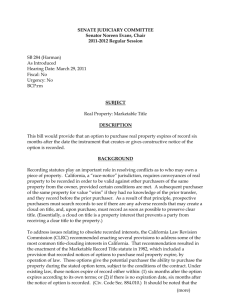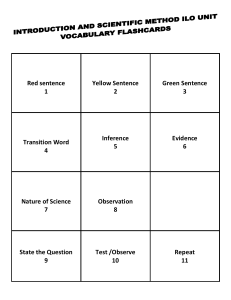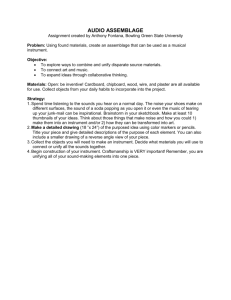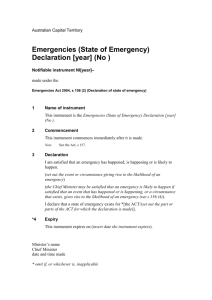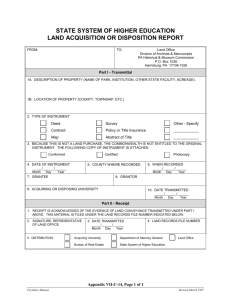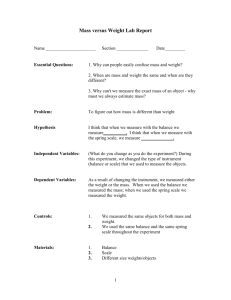Microsoft Word version
advertisement
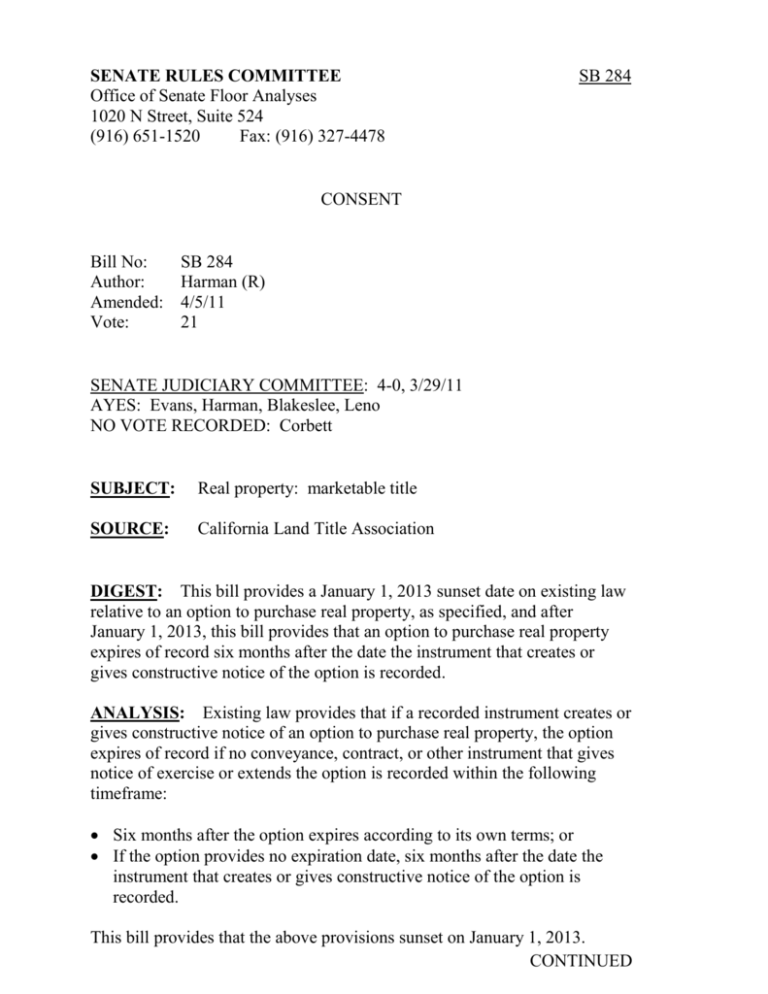
SENATE RULES COMMITTEE Office of Senate Floor Analyses 1020 N Street, Suite 524 (916) 651-1520 Fax: (916) 327-4478 SB 284 CONSENT Bill No: Author: Amended: Vote: SB 284 Harman (R) 4/5/11 21 SENATE JUDICIARY COMMITTEE: 4-0, 3/29/11 AYES: Evans, Harman, Blakeslee, Leno NO VOTE RECORDED: Corbett SUBJECT: Real property: marketable title SOURCE: California Land Title Association DIGEST: This bill provides a January 1, 2013 sunset date on existing law relative to an option to purchase real property, as specified, and after January 1, 2013, this bill provides that an option to purchase real property expires of record six months after the date the instrument that creates or gives constructive notice of the option is recorded. ANALYSIS: Existing law provides that if a recorded instrument creates or gives constructive notice of an option to purchase real property, the option expires of record if no conveyance, contract, or other instrument that gives notice of exercise or extends the option is recorded within the following timeframe: Six months after the option expires according to its own terms; or If the option provides no expiration date, six months after the date the instrument that creates or gives constructive notice of the option is recorded. This bill provides that the above provisions sunset on January 1, 2013. CONTINUED SB 284 Page 2 After January 1, 2013, this bill revises those timeframes to, instead, expire those options of record: six months after an expiration date that is ascertainable from the recorded instrument; or six months after the recordation of the instrument that creates or gives notice of the option if (1) the expiration date of the option is not ascertainable from the recorded instrument, or (2) the recorded instrument indicates that the option provides no expiration date. This bill also makes a technical/typographical change to a related section. Background Recording statutes play an important role in resolving conflicts as to who may own a piece of property. California, a “race-notice” jurisdiction, requires conveyances of real property to be recorded in order to be valid against other purchasers of the same property from the owner, provided certain conditions are met. A subsequent purchaser of the same property for value “wins” if they had no knowledge of the prior transfer, and they record before the prior purchaser. As a result of that principle, prospective purchasers must search records to see if there are any adverse records that may create a cloud on title, and, upon purchase, must record as soon as possible to preserve clear title. (Essentially, a cloud on title is a property interest that prevents a party from receiving a clear title to the property.) To address issues relating to obsolete recorded interests, the California Law Revision Commission (CLRC) recommended enacting several provisions to address some of the most common title-clouding interests in California. That recommendation resulted in the enactment of the Marketable Record Title statute in 1982, which included a provision that recorded notices of options to purchase real property expire, by operation of law. Those options give the potential purchaser the ability to purchase the property during the stated option term, subject to the conditions of the contract. Under existing law, those notices expire of record either within (1) six months after the option expires according to its own terms; or (2) if there is no expiration date, six months after the notice of option is recorded. (Civil Code Section 884.010.) It should be noted that the statute expires the “record notice” of CONTINUED SB 284 Page 3 the option, not the actual option itself; that record notice is important due to California being a “race-notice” jurisdiction. In 2009, the CLRC identified a gap in coverage of the above statute that could cause an obsolete option to cloud title in cases where “off-record” information is used to determine the option’s expiration. This bill, sponsored by the California Land Title Association, implements the CLRC’s recommendation to clarify that an option whose expiration date is not ascertainable from the recorded instrument expires of record six months after recording. Need for a deferred operative date CLRC has recommended a one-year operative date “[i]n order to avoid any unfair surprise to those who have recorded notice of an option to purchase real property under existing law …” That delayed operation is necessary so as to “provide sufficient time for those who have recorded notices to adjust to the change in the law.” FISCAL EFFECT: Appropriation: No Fiscal Com.: No Local: No SUPPORT: (Verified 4/5/11) California Land Title Association (source) ARGUMENTS IN SUPPORT: According to the author: “In most cases, the status of record notice of an option can be readily determined from the information provided in the notice itself, without any need to consult off-record information. However, there are circumstances in which the status of record notice cannot be determined from the title records alone. “That is because the status of record notice of an option depends on the expiration date of the option (if any). That information might not be included in the record, in which case off-record information would be required to determine the status of the record notice. “That would make it difficult or impossible for a title researcher to determine whether the record notice is effective, creating a cloud on title CONTINUED SB 284 Page 4 that may persist long after the underlying option has become obsolete. Judicial proceedings could be required to determine the status of title.” The author notes that this bill corrects this issue, after January 1, 2013, by allowing the statute at issue to “operate entirely on the basis of information that is ascertainable from the recorded document.” RJG:mw 4/6/11 Senate Floor Analyses SUPPORT/OPPOSITION: SEE ABOVE **** END ****
